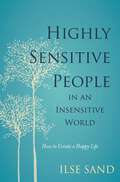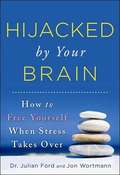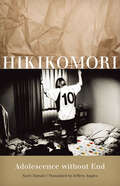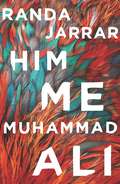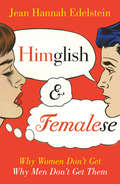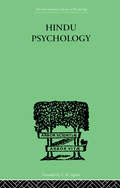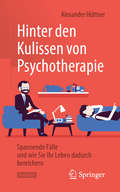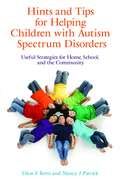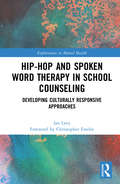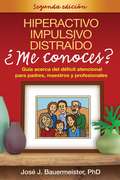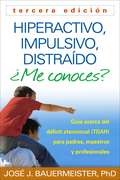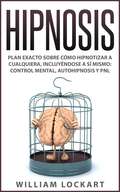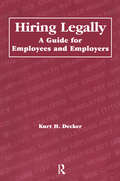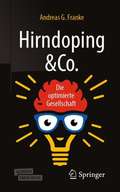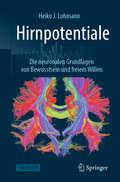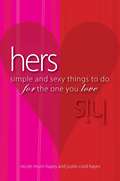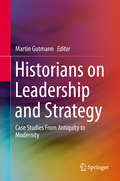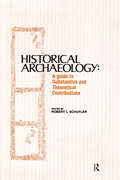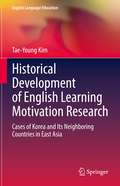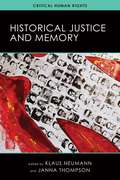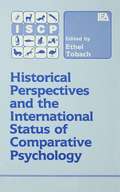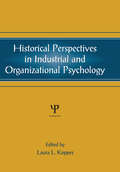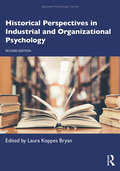- Table View
- List View
Highly Sensitive People in an Insensitive World: How to Create a Happy Life
by Elisabeth Svanholmer Ilse SandIn today's fast-paced, increasingly public society, we are expected to be resilient, to have the energy to manage a packed work schedule, social calendar, and a large network of friends, both online and offline, day and night. If you find yourself struggling to live up to, or even enjoy, these non-stop social expectations, then this book is for you. Written for highly sensitive people, the book explains the characteristics of being highly sensitive and how to overcome common difficulties, such as low self-esteem and the exhausting effects of socialising. Ilse Sand also encourages you to explore and appreciate the advantages of high sensitivity, including your aptitude for depth, intensity and presence, and suggests activities to calm and inspire.
Hijacked by Your Brain: How to Free Yourself When Stress Takes Over
by Julian Ford Jon WortmannHijacked by Your Brain is the first book to explain how stress changes your brain and what you can do about it. Stress is not the enemy. In order to reduce stress, you have to understand why your brain causes you to feel stress and how you can take advantage of it to handle the high-stress people and situations in your life. This groundbreaking book reveals the step missing in most stress reduction guides. We can't stop stress, but we can control the effect stress has on us. Hijacked by Your Brain is the user's manual for your brain that shows you how to free yourself when stress takes over.
Hikikomori: Adolescence without End
by Saito TamakiThis is the first English translation of a controversial Japanese best seller that made the public aware of the social problem of hikikomori, or &“withdrawal&”—a phenomenon estimated by the author to involve as many as one million Japanese adolescents and young adults who have withdrawn from society, retreating to their rooms for months or years and severing almost all ties to the outside world. Saitō Tamaki&’s work of popular psychology provoked a national debate about the causes and extent of the condition. Since Hikikomori was published in Japan in 1998, the problem of social withdrawal has increasingly been recognized as an international one, and this translation promises to bring much-needed attention to the issue in the English-speaking world. According to the New York Times, &“As a hikikomori ages, the odds that he&’ll re-enter the world decline. Indeed, some experts predict that most hikikomori who are withdrawn for a year or more may never fully recover. That means that even if they emerge from their rooms, they either won&’t get a full-time job or won&’t be involved in a long-term relationship. And some will never leave home. In many cases, their parents are now approaching retirement, and once they die, the fate of the shut-ins—whose social and work skills, if they ever existed, will have atrophied—is an open question.&”Drawing on his own clinical experience with hikikomori patients, Saitō creates a working definition of social withdrawal and explains its development. He argues that hikikomori sufferers manifest a specific, interconnected series of symptoms that do not fit neatly with any single, easily identifiable mental condition, such as depression. Rejecting the tendency to moralize or pathologize, Saitō sensitively describes how families and caregivers can support individuals in withdrawal and help them take steps toward recovery. At the same time, his perspective sparked contention over the contributions of cultural characteristics—including family structure, the education system, and gender relations—to the problem of social withdrawal in Japan and abroad.
Him, Me, Muhammad Ali
by Randa JarrarIn her first story collection, Jarrar employs a particular, rather than rhetorical approach to race and gender. Thus we have "How Can I Be of Use to You," with its complicated relationship between a distinguished Egyptian feminist and her young intern, demonstrating that gender politics are never straightforward, and both generations-old and new-take advantage of each other. There's also a healthy dose of magic surrealism, as in the wild and witty story "Zelda the Halfie" which follows a breed of half Ibexes/half humans and their various tribulations. The writing is peppered with gorgeous imagery: a moon reflected in an ice cream scoop, breath that runs ahead of its body, and two apartments in a high rise whose tenants precisely mirror each other.Randa Jarrar is the author of a highly successful novel, A Map of Home, which received an Arab-American Book Award and was named one of the best novels of 2008 by the Barnes & Noble Review. She grew up in Kuwait and Egypt, and moved to the United States after the first Gulf War. Her work has appeared in the New York Times Magazine, the Utne Reader, Salon.com, Guernica, the Rumpus, the Oxford American, Ploughshares, and more. She blogs for Salon, and lives in California.
Himglish and Femalese: Why women don't get why men don't get them
by Jean Hannah EdelsteinAs we tumble headlong into the second decade of the third millennium, we are in an era of unprecedented freedom to be whatever we want to be, in defiance of fusty old gender stereotypes. But while the women revel in ruling the boardroom, the men make magic in the kitchen, and everyone does rather unusual things in the bedroom, all of this freedom does have its downside: without understanding the fundamental differences between the genders, we're in for an era of dire confusion when it comes to living with the other half of humanity.But don't furrow your brow. Jean Hannah Edelstein is here to lead you through the perplexing questions of what it means to be a man or a woman in the twenty-first century.With a spectacular talent for unpicking social trends, Edelstein draws equally on experiential and anecdotal evidence, as well as the latest scientific studies, delivering a witty, edgy and definitive manual to understanding your partner/husband/boyfriend/girlfriend. Welcome a fresh new expert on men and women and the contradictory languages they speak.
Hindu Psychology: Its Meaning for the West (International Library Of Psychology Ser.)
by Swami AkhilanandaThe six volume Psychology ann Religion set of the International Library of Psychology explores the interface between psychology and religion, looking at aspects of religious belief and mysticism as related to the study of human consciousness. Hindu Psychology looks at the relevance of Hindu belief systems and theories of perception for the West.
Hinter den Kulissen von Psychotherapie: Spannende Fälle und wie Sie Ihr Leben dadurch bereichern
by Alexander HüttnerSie wollten schon immer einmal wissen, was in einer Psychotherapie passiert? Was tun Therapeuten, um ihre Klienten bei der Bewältigung psychischer Krisen zu begleiten und zu unterstützen? Und welche Hintergedanken haben Therapeuten eigentlich dabei?Dieses Sachbuch gewährt einen Blick hinter die Kulissen von Psychotherapie und damit Einblicke in die Arbeit und Gedanken eines Therapeuten. Anhand realer Fälle werden alltagsnahe Problemen wie z.B. Angst, Hilflosigkeit, Unzufriedenheit in der Ehe oder Depressionen dargestellt. Dank zusätzlicher Analyse erfahren Sie leicht verständlich, wie psychotherapeutische Arbeit abläuft, wie diese gelingen oder auch scheitern kann. Lernen Sie zudem, wie Sie aus den Fallbeschreibungen anhand eines einfach verständlichen Prinzips wichtige Schlüsse für Ihr eigenes Leben ziehen können, um dieses zufrieden und selbstbestimmt leben zu können.
Hints and Tips for Helping Children with Autism Spectrum Disorders: Useful Strategies for Home, School, and the Community
by Dion Betts Nancy J PatrickIf you have a child on the autism spectrum who struggles with the challenges of daily life, then this book is for you! Hints and Tips... is peppered with vignettes and stories of real-life situations and successes, and offers clever ideas for tackling everyday difficulties, such as bathing, bedtime, school trips, and selecting the right child minder. Dion E. Betts and Nancy J. Patrick provide creative, practical strategies to help parents and caregivers to support their child, and to enable their child to develop the social skills needed to manage and enjoy daily life to the fullest. The book is split into five parts: home life, hygiene, community, medical, and schools and organizations. Common problem areas are also tackled in a toolkit section, which includes checklists, 'to do' lists, visual schedules, and mnemonics to aid memory and retrieval. Hints and Tips for Helping Children with Autism Spectrum Disorders is an essential aid for parents and carers to make small and simple changes that result in big improvements in the quality of life of children, their families, and carers.
Hip-Hop and Spoken Word Therapy in School Counseling: Developing Culturally Responsive Approaches (Explorations in Mental Health)
by Ian LevyThis volume recognizes the need for culturally responsive forms of school counseling and draws on the author’s first-hand experiences of working with students in urban schools in the United States to illustrate how hip-hop culture can be effectively integrated into school counseling to benefit and support students. Detailing the theoretical development, practical implementation and empirical evaluation of a holistic approach to school counseling dubbed "Hip-Hop and Spoken Word Therapy" (HHSWT), this volume documents the experiences of the school counsellor and students throughout a HHSWT pilot program in an urban high school. Chapters detail the socio-cultural roots of hip-hop and explain how hip-hop inspired practices such as writing lyrics, producing mix tapes and using traditional hip-hop cyphers can offer an effective means of transcending White, western approaches to counseling. The volume foregrounds the needs of racially diverse, marginalized youth, whilst also addressing the role and positioning of the school counselor in using HHSWT. Offering deep insights into the practical and conceptual challenges and benefits of this inspiring approach, this book will be a useful resource for practitioners and scholars working at the intersections of culturally responsive and relevant forms of school counseling, spoken word therapy and hip-hop studies.
Hiperactivo, Impulsivo, Distraído ¿Me conoces?, Segunda edición
by José J. BauermeisterEscrita específicamente para los padres y los maestros de habla hispana, esta guía práctica y realista ofrece consejos esenciales para ayudar a los niños con el TDA o el TDAH. El destacado experto, Dr. José J. Bauermeister, extrae los conocimientos científicos más recientes sobre estos problemas y describe medidas claras que se pueden tomar para reforzar las habilidades de su niño, encontrar los tratamientos apropiados, promover el éxito escolar y mejorar su comportamiento tanto en la casa como en la escuela. A lo largo de su carrera, el Dr. Bauermeister se ha dedicado a trabajar con niños y familias hispanas, cuyas experiencias y cultura únicas están reflejadas en cada página. El contenido especial de esta edición incluye la información más actualizada sobre los medicamentos y cuándo (y cuándo no) se deben usar; el problema del TDAH en las niñas, frecuentemente pasado por alto; cómo explicar el trastorno a los niños; consejos para aumentar la autoestima, y mucho más. Written specifically for Spanish-speaking parents and teachers, this practical, down-to-earth resource offers essential guidance for helping children with ADD or ADHD. Leading expert Dr. José J. Bauermeister distills the latest scientific knowledge about these problems and describes clear steps you can take to build on your child's strengths, find the right treatments, promote school success, and improve behavior both at home and in school. Dr. Bauermeister has devoted his career to working with Hispanic children and families, whose unique experiences and culture are reflected on every page. Special features of this edition include the latest information on medications and when (and when not) to use them, the often-overlooked problem of ADHD in girls, how to explain the disorder to kids, tips to increase self-esteem, and much more.
Hiperactivo, Impulsivo, Distraído ¿Me conoces?, Tercera edición
by Russell A. Barkley José J. BauermeisterSi su hijo ha recibido un diagnóstico del trastorno por déficit de atención con hiperactividad (TDAH), usted necesita orientación y apoyo en los que pueda confiar. Ha llegado al lugar correcto. Uno de los principales expertos, el Dr. José J. Bauermeister, explica, con claridad, la naturaleza de los problemas de atención y las razones por las que los niños con estos trastornos actúan como lo hacen. Usted aprenderá estrategias cuya eficacia ha sido comprobada para superar los frustrantes problemas de la conducta, para ayudar a su hijo a tener éxito en la escuela y, de ser necesario, para encontrar la ayuda profesional adecuada. El Dr. Bauermeister ha dedicado su carrera a trabajar con niños hispanos y con familias hispanas cuyas experiencias y culturas distintivas se reflejan en cada página. Escrito en español (no traducido), este libro es un recurso único para ayudarlo(a) a usted a satisfacer las necesidades de su hijo. Además, proporciona información esencial para maestros y otros profesionales. Esta tercera edición, revisada y actualizada, incluye la investigación científica y las estrategias de tratamiento más recientes. If your child has been diagnosed with attention-deficit/hyperactivity disorder (ADHD), you need guidance and support that you can trust. You've come to the right place. Leading expert Dr. José J. Bauermeister clearly explains the nature of attention problems and why children with these disorders act the way they do. You'll learn proven strategies for overcoming frustrating behavior problems, helping your son or daughter succeed in school, and, if needed, finding the right professional help. Dr. Bauermeister has devoted his career to working with Hispanic children and families, whose unique experiences and culture are reflected on every page. Written in Spanish (not a translation), this is a unique resource to help you meet the needs of your child. It also provides essential information for teachers and other professionals. Revised and updated, the third edition includes the latest scientific research and treatment strategies.
Hipnosis
by William LockhartSu arma es la lucha contra el estrés. ¿Está usted buscando maneras para mitigar el estrés? ¿Ha buscado y no ha encontrado nada que parezca funcionar? Puede que usted no esté familiarizado con esto, pero, ¿sabe usted que la hipnosis puede eliminar todo el estrés que está sintiendo justo ahora? En general, el poder de nuestra mente nos puede hacer sentir cosas que, en primer lugar, ni siquiera deberían estar ahí. Cuando sembramos buenas semillas en nuestra mente, se refleja en el exterior y lo mismo ocurre también cuando sembramos las malas. ¿Alguna vez escuchó decir: “Lo que piensas, se manifiesta”? Estoy seguro de que sí. Aquí es donde aparece el hipnotismo. Es una herramienta terapéutica que produce un equilibrio tanto mental como emocional. También se ha demostrado que proporciona relajación física, alivio del dolor, un mejor sueño y reduce la ansiedad. Aunque la palabra ‘hipnosis’ resulta bastante fuerte para muchas personas, se considera segura cuando se realiza con las precauciones adecuadas. En este libro se comentan 4 temas: ¿Qué es el hipnotismo? Autohipnosis – Preparación El juego real: Fase II y Fase III Cómo hipnotizar a una persona Esta es su guía didáctica para practicar el hipnotismo. Cuenta con detalles completos que satisfarán su entendimiento y ¡harán que tenga una experiencia exitosa! La hipnosis no está limitada únicamente para uno mismo; ciertamente puede hacerlo a otras personas que estén dispuestas a someterse a esta terapia. Todo lo que usted necesita es práctica.
Hiring Legally: A Guide for Employees and Employers
by Kurt H. DeckerThe principles, procedures, and policies applicable to hiring are reviewed by this book to assist in minimizing litigation risks for employers and acquainting employees with these employer procedures to protect their disclosures of non-job-related information. Areas covered include the hiring process, pre-employment screening fundamentals, data verification, and federal and state statutes affecting the hiring process.
Hirndoping & Co.: Die optimierte Gesellschaft
by Andreas G. FrankeLeistungssteigerung per Pille oder kurz „Hirndoping“ ist zu einem regelrechten Trend geworden, der innerhalb weniger Jahre besorgniserregende Ausmaße angenommen hat. Doch wie kommt das?Das Buch beleuchtet das brisante Thema „Hirndoping" erstmals aus zahlreichen Blickwinkeln wie Soziologie, Medizin, Sport- und Rechtswissenschaften und vielen weiteren Disziplinen.Es zeichnet den Weg von der Agrargesellschaft, in der die Geschwindigkeit des Lebens von den natürlichen Gegebenheiten abhing, bis in die heutige Zeit nach. Eine Zeit, in der es durch Globalisierung und Digitalisierung vermeintlich keine Grenzen mehr gibt. Die letzte Grenze, die es zu überwinden gilt, scheint unser Geist. „Hirndoping“ bietet sich hier als Antwort aus den Regalen der Arzneimittelindustrie an. Eine Antwort, die aber nur begrenzt funktioniert und die gesundheitlich, juristisch und ethisch nicht frei von Risiken und Nebenwirkungen ist. Alternativlos ist „Hirndoping“ jedenfalls nicht.
Hirnpotentiale: Die neuronalen Grundlagen von Bewusstsein und freiem Willen
by Heiko J. LuhmannDer Neurophysiologe Heiko Luhmann erforscht seit mehr als 35 Jahren die Funktionsweise von Nervenzellen und neuronalen Netzen. In diesem spannenden und provozierenden Buch informiert er Sie über die neuesten Erkenntnisse der Hirnforschung und wie diese unsere Vorstellungen über das Bewusstsein und den freien Willen verändern. Sie erfahren, dass die Trennung von Körper und Geist aus neurowissenschaftlicher Sicht nicht aufrechterhalten werden kann und wie unterschiedliche Wissenschaftsdisziplinen ein neues Konzept zur Funktionsweise unseres Gehirns entwickeln. Das Buch beschäftigt sich mit spannenden grundlegenden Fragen, wie:Warum gibt es überhaupt Gehirne? Wie kommt die Welt in den Kopf? Wie sind interne neuronale Karten aufgebaut? Wo ist das Bewusstsein lokalisiert und wie entsteht es? Hat der Oktopus ein Bewusstsein? Ist das Gehirn eine Prädiktionsmaschine? Erlaubt das Konzept der prädiktiven Kodierung einen freien Willen? Entwickeln wir mit Hilfe eines Hirn-Computer-Interfaces ein höheres Bewusstein? Sind wir technologisch in der Lage Gedanken zu lesen und zu erzeugen? Verfügen Roboter eines Tages über ein künstliches Bewusstsein?
Hiroshima
by Ran ZwigenbergIn 1962, a Hiroshima peace delegation and an Auschwitz survivor's organization exchanged relics and testimonies, including the bones and ashes of Auschwitz victims. This symbolic encounter, in which the dead were literally conscripted in the service of the politics of the living, serves as a cornerstone of this volume, capturing how memory was utilized to rebuild and redefine a shattered world. This is a powerful study of the contentious history of remembrance and the commemoration of the atomic bomb in Hiroshima in the context of the global development of Holocaust and World War II memory. Emphasizing the importance of nuclear issues in the 1950s and 1960s, Zwigenberg traces the rise of global commemoration culture through the reconstruction of Hiroshima as a 'City of Bright Peace', memorials and museums, global tourism, developments in psychiatry, and the emergence of the figure of the survivor-witness and its consequences for global memory practices.
His/Hers: Simple And Sexy Things to Do for the One You Love
by Justin Cord Hayes Nicole Murn HayesThis flip-book gives you two books for the price of one—including suggestions for men in one direction, and when you flip the book over, suggestions for women on the other. This romantic book provides creative gestures to keep romance alive in your relationship.
Historia de un duelo
by Carolina Soto Víctor El Khoury Jacky Cepeda"ESTE LIBRO ENCENDERÁ EN TU VIVIR LUCECITAS DE ESPERANZA". GONZALO GALLO En el año 2015 un accidente fatal cambió para siempre las vidas de la familia de Sofía El Khoury, hija de Víctor El Khoury y Jacky Cepeda, y hermana de la reconocida presentadora de televisión Carolina Soto. Pasado un tiempo, los tres narran, en este conmovedor y desgarrador testimonio, la historia de un duelo: el antes, el ahora y el después. Este relato es un devenir de emociones y dejará en los lectores una sensación de ilusión, de alivio y de fe, a pesar de la desolación y la tristeza que producen la partida de un ser querido. Es también un homenaje póstumo a Soffy, a la huella imborrable que dejó tras su alegre paso por este mundo terrenal, y un testimonio necesario para todos aquellos que luego de enfrentar un duelo, han encontrado una oportunidad y se han llenado de razones para vivir y honrar así a quienes ya no están.
Historians on Leadership and Strategy: Case Studies From Antiquity to Modernity
by Martin GutmannThis book examines the well-covered subject of leadership from a unique perspective: history's vast catalogue of leadership successes and failures. Through a collection of highly compelling case studies spanning two millennia, it looks beyond the classic leadership parable of men in military or political crises and shows that successful leadership cannot be reduced to simplistic formulae.Written by experts in the field and based on rigorous research, each case provides a rich and compelling account that is accessible to a wide audience, from students to managers. Rather than serving as a vehicle for advancing a particular theory of leadership, each case invites readers to reflect, debate and extract their own insights.
Historical Archaeology: A Guide to Substantive and Theoretical Contributions
by Robert L SchuylerA sourcebook devoted to historical archaeology, a significant field of study which blends together the theories and methods of anthropology, history, and archaeology.
Historical Development of English Learning Motivation Research: Cases of Korea and Its Neighboring Countries in East Asia (English Language Education #21)
by Tae-Young KimThis book clarifies the fundamental difference between North America-based instrumental motivation and Korea (and East Asia)-specific competitive motivation by which the EFL learners’ excessive competition to be admitted to famous universities and to be hired at a large-scale conglomerate is the main source of L2 motivation. It enables readers to understand that EFL-learning motivation reflects unique sociohistorical contexts grounded in a specific region or country. This book in turn necessitates the need to develop EFL motivation theory and research tradition which are firmly based on East Asian values and culture.
Historical Justice and Memory
by Klaus Neumann Janna ThompsonHistorical Justice and Memory highlights the global movement for historical justice--acknowledging and redressing historic wrongs--as one of the most significant moral and social developments of our times. Such historic wrongs include acts of genocide, slavery, systems of apartheid, the systematic persecution of presumed enemies of the state, colonialism, and the oppression of or discrimination against ethnic or religious minorities. The historical justice movement has inspired the spread of truth and reconciliation processes around the world and has pushed governments to make reparations and apologies for past wrongs. It has changed the public understanding of justice and the role of memory. In this book, leading scholars in philosophy, history, political science, and semiotics offer new essays that discuss and assess these momentous global developments. They evaluate the strength and weaknesses of the movement, its accomplishments and failings, its philosophical assumptions and social preconditions, and its prospects for the future.
Historical Perspectives and the International Status of Comparative Psychology
by Ethel TobachPublished in 1987, Historical Perspectives and the International Status of Comparative Psychology is a valubale contribution to the field of Psychology PP.
Historical Perspectives in Industrial and Organizational Psychology (Applied Psychology Series)
by Eduardo Salas Andrew J. Vinchur Laura L. Koppes Paul W. ThayerThis unique book is the first to contain a comprehensive history of industrial and organizational psychology, covering numerous topics in the discipline. The history presented offers various perspectives, including the contributions of individuals, organizations, and contextual or situational forces, as well as an international viewpoint. The authors, all highly regarded experts in their respective topics, use a range of approaches to examine history, demonstrating to readers that there are multiple ways to understand history. This volume will be of interest to industrial and organizational psychologists, business and management academics and professionals, historians of psychology, business, science and science and technology, undergraduate, and graduate students.
Historical Perspectives in Industrial and Organizational Psychology (Applied Psychology Series)
by Laura Koppes BryanHistorical Perspectives in Industrial and Organizational Psychology, Second Edition updates the first edition with the latest creative and scholarly views of I-O psychology to provide a complete, up-to-date understanding of this discipline’s history within a contemporary context. This new edition includes updated chapters from the first edition as well as three completely new chapters: a history of LGBTQ+ employees’ workplace experiences, the evolution of worker well-being and work-life issues, and a reflection on the importance of context when studying workplaces and whether or not the science and practice of I-O psychology is prepared for the future. Historical Perspectives in Industrial and Organizational Psychology, Second Edition compiles chapters written from the historical perspectives of I-O psychologists, historians, and other experts in their fields, all of whom use historical analyses as the method of inquiry rather than provide summarized overviews of the topics. Chapter authors rely on archival materials, primary and secondary sources, as well as interviews with luminaries and experts. Historical Perspectives in Industrial and Organizational Psychology, Second Edition is essential reading for contemporary and aspiring scholars of I-O psychology and related fields, such as history of psychology, human resource management, organizational behavior, and public administration. Both scientists and practitioners will benefit from reading this text.
